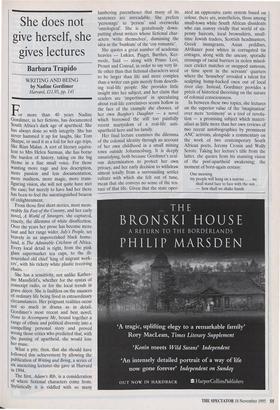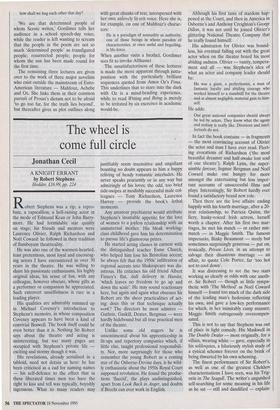She does not give herself, she gives lectures
Barbara Trapido
WRITING AND BEING by Nadine Gordimer Harvard, £11.95, pp. 145 For more than 40 years Nadine Gordimer, in her fictions, has documented South Africa's dark age of apartheid. She has always done so with integrity. She has never hammed it up for laughs, like Tom Sharpe, or used it as a foil for her ego trips, like Rian Malan. A sort of literary equiva- lent to Mrs Helen Suzman, she has borne the burden of history, taking on the big theme in a fine small voice. For those wanting more rage and less description, more passion and less documentation, more madness, more magic, more trans- figuring vision, she will not quite have met the case; but merely to have had her there has been to feel the unextinguished beacon of enlightenment.
From those first short stories, most mem- orably Six Feet of the Country, and her early novel, A World of Strangers, she captured, exactly, the dilemma of white disaffection. Over the years her prose has become more taut and her range wider. July's People, set bravely in an impoverished black home- land, is The Admirable Crichton of Africa. Every local detail is right, from the pink glass supermarket tea cups, to the ill- nourished old chief 'king of migrant work- ers', with his rickety white plastic receiving chairs.
She has a sensitivity, not unlike Kather- ine Mansfield's, whether for the syntax of conscript radio, or for the local trends in grave decor. She is faultless on the nuances of ordinary life being lived in extraordinary Circumstances. Her poignant realities occur not so much in drama as in detail. Gordimer's most recent and best novel, None to Accompany Me, bound together a range of ethnic and political diversity into a Compelling personal story and proved wrong those critics who predicted that, with the passing of apartheid, she would lose her muse.
What a pity, then, that she should have followed this achievement by allowing the publication of Writing and Being, a series of six unexciting lectures she gave at Harvard in 1994.
The first, Adam's Rib, is a consideration of where fictional characters come from. Stylistically it is riddled with so many lumbering parentheses that many of its sentences are unreadable. She prefers `personage' to 'person' and overworks `ontological'. She is gratuitously down- putting about writers whose fictional char- acters 'write themselves', dismissing the idea as the 'bunkum' of the 'coy romantic'.
She quotes a great number of academic heavies — Lukacs, Piaget, Barthes, Ker- mode, Said — along with Primo Levi, Proust and Conrad, in order to say very lit- tle other than that fictional characters need to be larger than life and more complex than a writer can gain merely from describ- ing real-life people. She provides little insight into her subject, and her claim that readers are 'impertinent' in speculating about real-life correlatives seems hollow in the face of the example she chooses, of her own Burgher's Daughter — a novel which borrowed the still too painfully recent martyrdom of a real-life anti- apartheid hero and his family. Her final lecture examines the dilemma of the colonial identity through an account of her own childhood in a small mining town outside Johannesburg. It is deeply unsatisfying, both because Gordimer's zeal- ous determination to protect her own privacy, and her early decision to withdraw almost totally from a surrounding settler culture with which she felt out of tune, mean that she conveys no sense of the tex- ture of that life. Given that the state oper- ated an oppressive caste system based on colour, there are, nonetheless, those among small-town white South African dissidents who can convey vividly that world of six- penny haircuts, local brownshirts, small- time Jewish traders, Scottish headmasters, Greek immigrants, Asian peddlars, Afrikaner poor whites in corrugated tin cottages, along with the uneasy, sporadic crossings of racial barriers in stolen mixed- race cricket matches or swapped samosas, or time spent in the servants' quarters where the touseboy' revealed a talent for sculpting hump-backed oxen out of local river clay. Instead, Gordimer provides a précis of historical theorising on the nature of colonial consciousness.
In between these two topics, she lectures on the superior value of the 'imagination' over mere 'testimony' as a tool of revolu- tion — a promising subject which materi- alises as little more than her own reviews of two recent autobiographies by prominent ANC activists, alongside a commentary on the work of two contemporary South African poets, Jeremy Cronin and Wally Serote. Taking her lecture's title from the latter, she quotes from his stunning vision of the post-apartheid awakening; the moment of born-again ecstasy:
One morning my people will hang on a sunrise ... we shall stand face to face with the sun .. . — how shall we shake hands how shall we hug each other that day?
`We are that determined people of whom Serote writes,' Gordimer tells her audience in a school speech-day voice, while the reader is left wanting to scream that the people in the poem are not so much 'determined people' as transfigured people; resurrected people; people for whom the sun has been made round for the first time.
The remaining three lectures are given over to the work of three major novelists who exist outside the mainstream of Euro- American literature — Mahfouz, Achebe and Oz. She links them in their common pursuit of Proust's dictum not to be afraid `to go too far, for the truth lies beyond', but thereafter gives us plot outlines along with great chunks of text, interspersed with her own unlovely lit-crit voice. Here she is, for example, on one of Mahfouz's charac- ters: He is a paradigm of sensuality as authority, one of those beings in whom paradox of characteristics, at once awful and beguiling, is life-force.
When another visits a brothel, Gordimer sees fit to invoke Althusser.
The unsatisfactoriness of these lectures is made the more apparent through juxta- position with the particularly brilliant sequences quoted from Amos Oz's Pima. This underlines that to stare into the dark with Oz is a mind-bending experience, while to read Writing and Being is merely to be irritated by six exercises in academic would-be.



















































































 Previous page
Previous page